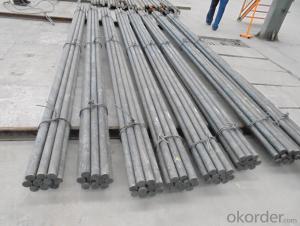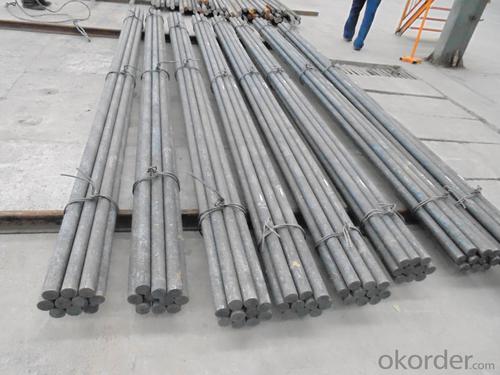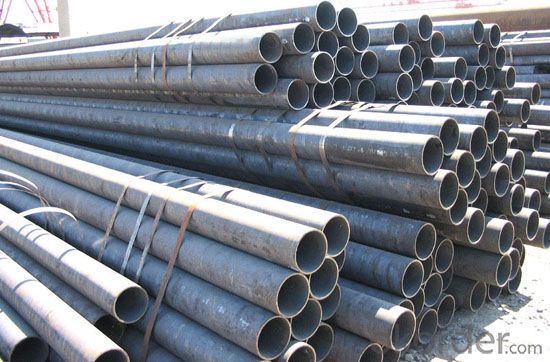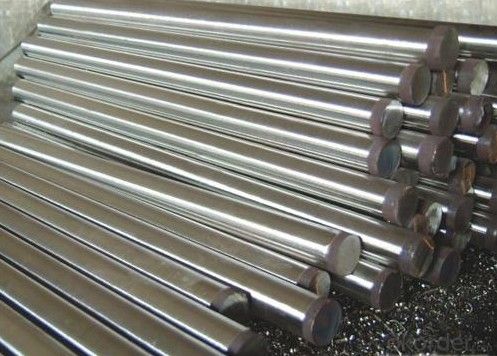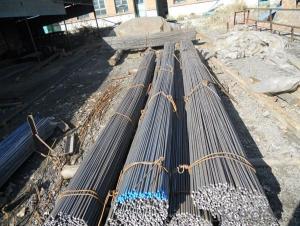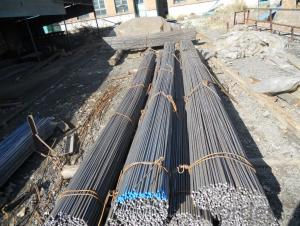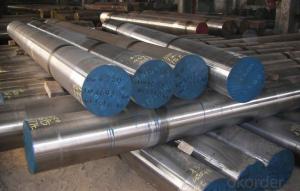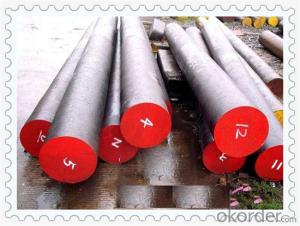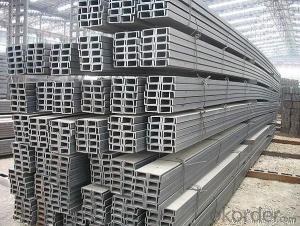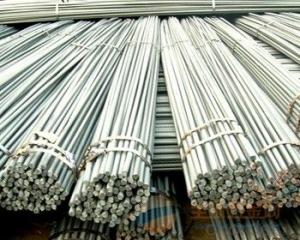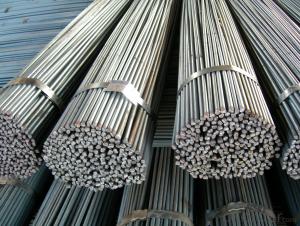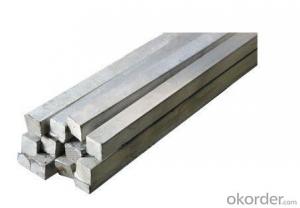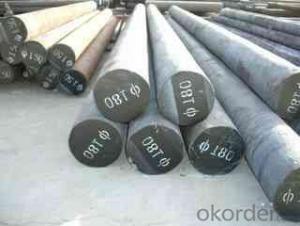5mm to 100mm round steel bar for construction
- Loading Port:
- Tianjin
- Payment Terms:
- TT OR LC
- Min Order Qty:
- 25000 m.t.
- Supply Capability:
- 10000 m.t./month
OKorder Service Pledge
OKorder Financial Service
You Might Also Like
Specifications of Steel Round Bar:
1. Standard: GB
2. Grade: Q345
3. Invoicing on theoretical weight or actual weight as customer’s request
4. Shape: Round bar, solid bar of steel with circular section
5. Technique: Hot rolled
Packaging & Delivery of Steel Round Bar:
Packaging Detail: Standard seaworthy packing or as customer required; all goods are packed in bundle with steel strips and shipped by break bulk vessel or container
Delivery Detail: 45 days
Trade terms: FOB, CFR, CIF or as customer required
MOQ: 25 tons per specification; we can negotiate the quantity if the specification is normal or we have stock of one specification.
Weight: The price invoicing on theoretical weight basis or actual weight basis depends on customer’s request.
Shipment: The shipment of bulk break or container is depends on customer’s request.
Documents given: Full set (3/3) of original clean on board bill of lading; Original signed commercial invoice, in 3 originals and 3 copies; Original packing list in 3 originals and 3 copies; Policy of insurance; Certificate of origin and what the target market needs.
Specification of Spring Steel:
-Material: 70Si2CrA
-Production: Hot rolled or cold rolled
-Standard: GB/T·5218-1999
-Type: Spring Steel
-Alloy or no: Alloy
Chemical Composition:
C | Mn | Si | Cr |
0.65~0.75 | 0.40~0.60 | 1.40~1.70 | 0.20~0.40 |
S | P | Ni | |
≤0.030 | ≤0.030 | ≤0.030 |
Mechanical Properties:
-Annealing Condition:
1, Tensile Strength: σb/MPa:≤835
2, Elongation: δ/%:≥8
-Quencher condition:
1, Tensile strength: σb/MPa:785~1175
2, Elongation: -
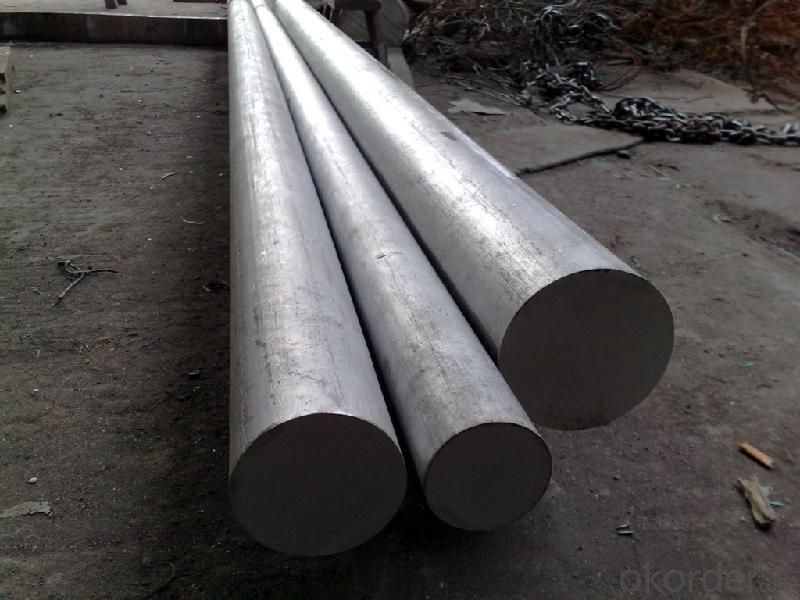
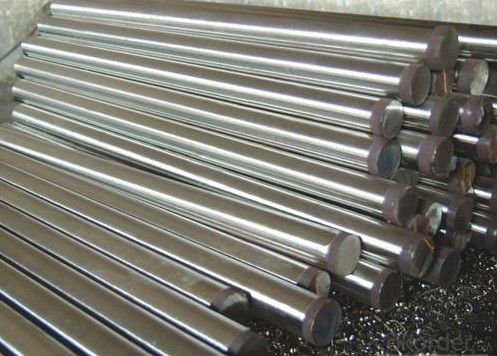
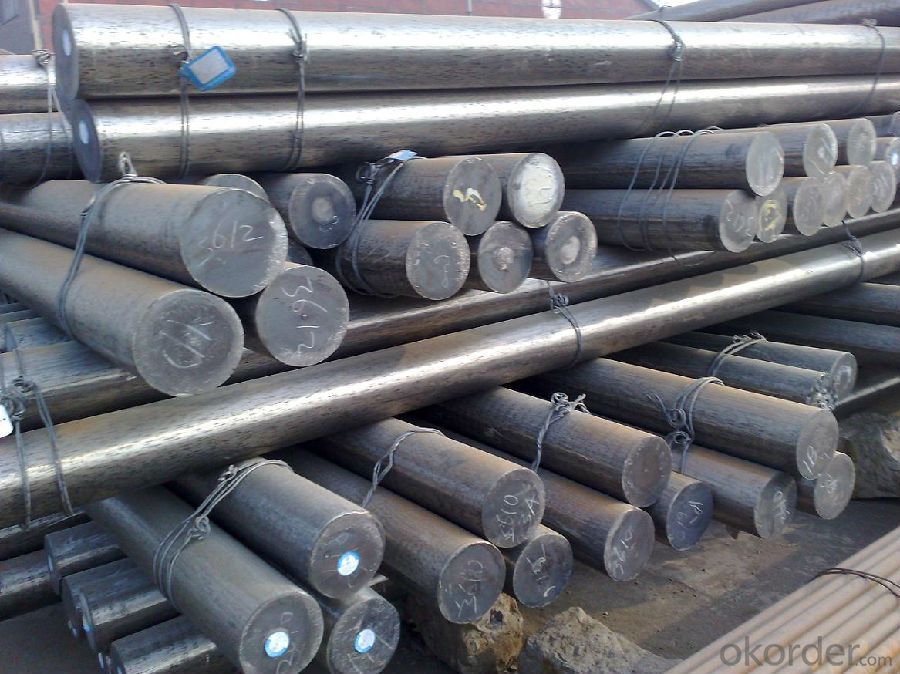
- Q: What are the different types of steel round bar heat treatments?
- Some common types of heat treatments for steel round bars include annealing, normalizing, quenching and tempering, and case hardening.
- Q: What are the different types of steel round bar alloys for improved toughness?
- Improved toughness is a characteristic associated with various steel round bar alloys. These alloys are specifically formulated to enhance the steel's capacity to withstand impact and resist deformation. Some commonly utilized steel round bar alloys for improved toughness comprise: 1. 4140 Alloy Steel: Renowned for its exceptional toughness and high tensile strength, this alloy finds application in areas that necessitate high impact resistance, such as automotive parts, gears, and shafts. 2. 4340 Alloy Steel: Similar to 4140, 4340 alloy steel offers remarkable toughness and strength. It is frequently employed in applications requiring high fatigue resistance, such as aircraft landing gear components and crankshafts. 3. 8620 Alloy Steel: This alloy is ideal for situations that demand both toughness and good wear resistance. It is commonly employed in gears, pinions, and other high-stress components. 4. 52100 Alloy Steel: Recognized for its high toughness and excellent wear resistance, 52100 alloy steel is frequently used in bearings, valve parts, and other heavy-duty applications. 5. H13 Tool Steel: While predominantly used in hot work applications, H13 tool steel is also acknowledged for its toughness and ability to withstand high impact loads. It is often employed in die casting dies, extrusion dies, and forging dies. 6. A2 Tool Steel: A2 tool steel is another alloy celebrated for its toughness and good wear resistance. It is commonly utilized in cutting tools, punches, and dies. These examples represent merely a fraction of the numerous steel round bar alloys meticulously engineered to deliver enhanced toughness. The selection of the appropriate alloy is contingent upon the specific requirements of the application and the desired level of toughness.
- Q: How are steel round bars used in the mining industry?
- Steel round bars are widely used in the mining industry for a variety of applications. One of the most common uses is in the construction and reinforcement of underground support systems. These bars are often used as roof bolts or rock bolts to provide stability and prevent cave-ins or roof falls in underground mines. Steel round bars are also used in the manufacturing of drilling equipment. They are frequently used as drill rods or drill bits, providing the necessary strength and durability to withstand the harsh conditions of drilling in mining operations. These bars are typically heat-treated to increase their hardness and resistance to wear, ensuring their longevity in the drilling process. Another important application of steel round bars in mining is in the production of grinding media for grinding mills. These bars, known as grinding rods, are used to grind and crush ore particles in the milling process. They are made from high-quality steel and have a specific hardness and toughness to effectively break down the ore into smaller particles, facilitating the extraction of valuable minerals. Additionally, steel round bars are used in the construction of conveyor systems in mining operations. They are commonly used as support bars or rollers in conveyor belts, ensuring the efficient transport of mined materials from one location to another. In summary, steel round bars play a crucial role in the mining industry. From providing support and stability in underground mines to manufacturing drilling equipment and grinding media, these bars are essential in various mining processes, contributing to the overall efficiency and productivity of mining operations.
- Q: What is the difference between a centerless ground and a polished steel round bar?
- Both a centerless ground steel round bar and a polished steel round bar are types of steel bars that have undergone different finishing processes, resulting in unique qualities and characteristics. To produce a centerless ground steel round bar, the surface of the steel bar is ground using a specialized machine called a centerless grinder. This process effectively eliminates any imperfections or irregularities on the surface, resulting in a smooth and uniform finish. Additionally, the centerless grinding process ensures that the diameter of the bar remains consistent throughout its length. As a result, centerless ground steel round bars are ideal for applications that require precise dimensions and a smooth surface, such as machining operations or as a base material for further processing. On the contrary, a polished steel round bar is achieved through a polishing process, in which the surface of the steel bar is buffed and polished using abrasive materials. This process enhances the aesthetic appearance of the steel bar, giving it a shiny and reflective surface. Unlike centerless grinding, polishing does not involve the removal of material from the surface, but rather focuses on smoothing and refining it. As a result, polished steel round bars are commonly used in decorative applications, such as architecture, interior design, or as components in high-end furniture. In conclusion, the main distinction between a centerless ground steel round bar and a polished steel round bar lies in the finishing process. Centerless grinding focuses on achieving precise dimensions and a smooth surface, making it suitable for functional applications. On the other hand, polishing aims to enhance the visual appeal of the steel bar, making it more suitable for decorative purposes.
- Q: What are the advantages of using creep-resistant steel round bars?
- There are several advantages of using creep-resistant steel round bars in various applications. Firstly, creep-resistant steel round bars offer excellent resistance to high temperatures and prolonged exposure to stress. This makes them ideal for use in applications that involve high temperature environments, such as power plants, boilers, and engines. The ability to withstand elevated temperatures without losing their mechanical properties is a key advantage of creep-resistant steel round bars. Secondly, these round bars have superior creep strength, which means they can withstand constant stress over a long period of time without deforming or failing. This is particularly important in applications where the component is subjected to continuous stress, such as in pressure vessels or structural components of machinery. The high creep strength of these bars ensures the longevity and reliability of the components. Additionally, creep-resistant steel round bars have excellent corrosion resistance. They are often alloyed with elements such as chromium, molybdenum, or nickel, which enhance their resistance to corrosion in harsh environments. This makes them suitable for use in industries such as oil and gas, chemical processing, and marine applications where corrosion is a significant concern. Furthermore, creep-resistant steel round bars have good weldability, allowing for easy fabrication and assembly. They can be easily welded to other components without compromising their mechanical properties, making them versatile and cost-effective for various construction projects. Moreover, these round bars offer dimensional stability and high hardness, ensuring that the components maintain their shape and mechanical properties even under extreme conditions. This characteristic makes them suitable for use in applications that require high precision and accuracy, such as aerospace and automotive industries. In conclusion, the advantages of using creep-resistant steel round bars include their ability to withstand high temperatures, excellent creep strength, corrosion resistance, weldability, dimensional stability, and high hardness. These advantages make them a preferred choice for various industries where reliability, longevity, and performance under harsh conditions are crucial factors.
- Q: Are steel round bars suitable for architectural applications?
- Architectural applications can indeed make use of steel round bars. Steel, being a versatile and durable material, is commonly employed in construction and architectural projects. The utilization of steel round bars for architectural purposes offers numerous advantages. Primarily, steel round bars are renowned for their robustness and load-bearing capacity. They possess excellent tensile strength and can withstand heavy loads, making them suitable for applications where structural integrity is paramount. Whether employed as support beams, columns, or other structural elements, steel round bars offer a dependable and long-lasting solution. Furthermore, steel round bars exhibit high resistance to corrosion and fire, which is crucial for architectural applications. They can endure harsh weather conditions, including extreme temperatures, without compromising their structural integrity. This resistance to corrosion and fire renders steel round bars a secure and reliable choice for architectural projects. Moreover, steel round bars can be conveniently fabricated and customized to meet specific design requirements. They can be cut, welded, bent, and shaped into various forms, enabling architects and designers to create unique and innovative structures. The versatility of steel round bars makes them suitable for a wide range of architectural applications, such as bridges, stadiums, and high-rise buildings. Additionally, steel round bars are cost-effective in comparison to certain other building materials. They possess a longer lifespan and require minimal maintenance, thereby reducing the overall lifecycle costs of a project. The combination of cost-effectiveness, durability, and versatility contributes to the popularity of steel round bars in architectural applications. In conclusion, steel round bars are indeed appropriate for architectural applications. Their strength, resistance to corrosion and fire, ease of fabrication, and cost-effectiveness make them an ideal choice for a diverse array of architectural projects. Whether employed for structural elements or decorative purposes, steel round bars offer a reliable and aesthetically pleasing solution for architects and designers.
- Q: Can steel round bars be used in the production of sporting goods?
- Yes, steel round bars can be used in the production of sporting goods. Steel is a durable and strong material that can provide stability and support for various sporting equipment such as weights, bars for weightlifting, poles for pole vaulting, or components for bicycles and golf clubs.
- Q: Can steel round bars be painted or coated?
- Steel round bars can indeed be painted or coated, which is a widely adopted practice aimed at enhancing their appearance, safeguarding them against corrosion, and offering added functionality. Typically, this process involves thoroughly cleaning the bars' surface to eliminate any dirt, grease, or rust, and subsequently applying a primer or base coat, followed by a topcoat or finish. The choice of paint or coating relies on the particular requirements of the application, such as desired color, level of protection, or resistance to environmental conditions. Moreover, specific coatings can confer distinct properties, such as anti-slip, heat resistance, or chemical resistance. In general, painting or coating steel round bars proves to be an effective means of augmenting their aesthetics and durability.
- Q: What are the different types of steel round bars used in the manufacturing of bearings?
- There are several different types of steel round bars used in the manufacturing of bearings. The specific type of steel used will depend on various factors, such as the application, load capacity, and desired performance characteristics of the bearing. One commonly used type of steel for manufacturing bearings is through-hardened steel. This type of steel is heat-treated to achieve a uniform hardness throughout the entire bar. Through-hardened steel round bars provide excellent strength and wear resistance, making them suitable for high-load bearing applications. Another type of steel that is frequently used in bearing manufacturing is case-hardened steel. This steel is hardened only on the surface, while the core remains relatively soft. Case-hardened steel round bars offer a combination of high surface hardness for wear resistance and a softer core for improved toughness and impact resistance. Stainless steel is also utilized in the production of bearings, particularly in applications that require corrosion resistance or operate in harsh environments. Stainless steel round bars have excellent resistance to rust and corrosion, making them ideal for use in marine or chemical industries. Furthermore, alloy steel round bars are commonly employed in bearing manufacturing. These steels are made by adding various alloying elements, such as chromium, molybdenum, or nickel, to enhance specific properties like hardness, toughness, or heat resistance. Alloy steel round bars are often used in specialized bearing applications that require exceptional performance under high temperatures or extreme conditions. In summary, the different types of steel round bars used in bearing manufacturing include through-hardened steel, case-hardened steel, stainless steel, and alloy steel. Each type offers unique properties and characteristics that make them suitable for specific bearing applications.
- Q: What is the difference between a cold finished and a hot rolled steel round bar?
- The manufacturing processes and resulting properties of a cold finished steel round bar and a hot rolled steel round bar are different. To manufacture cold finished steel round bars, a cold drawing process is used. This involves pulling the steel through a die at room temperature. As a result, the steel has a smooth, polished surface with tight dimensional tolerances. Additionally, the cold drawing process improves the strength, hardness, and overall mechanical properties of the steel. Cold finished steel round bars are commonly used in applications where precision and a smooth surface are important, such as in machinery, automotive parts, and tools. In contrast, hot rolled steel round bars are manufactured by heating the steel to a high temperature and then rolling it through a series of rollers. This allows for shaping and forming while the steel is pliable. Hot rolled steel round bars have a rough, scaled surface and looser dimensional tolerances compared to cold finished bars. They also tend to have slightly lower strength and hardness. Due to their lower cost and ease of production, hot rolled steel round bars are frequently used in construction, structural components, and general fabrication. In summary, the differences between cold finished and hot rolled steel round bars are found in their manufacturing processes and resulting properties. Cold finished bars offer improved strength, precision, and a smooth surface, making them suitable for applications requiring high precision and mechanical performance. On the other hand, hot rolled bars have a rougher surface and looser tolerances, but their affordability and ease of production make them a popular choice for general applications.
Send your message to us
5mm to 100mm round steel bar for construction
- Loading Port:
- Tianjin
- Payment Terms:
- TT OR LC
- Min Order Qty:
- 25000 m.t.
- Supply Capability:
- 10000 m.t./month
OKorder Service Pledge
OKorder Financial Service
Similar products
Hot products
Hot Searches
Related keywords
